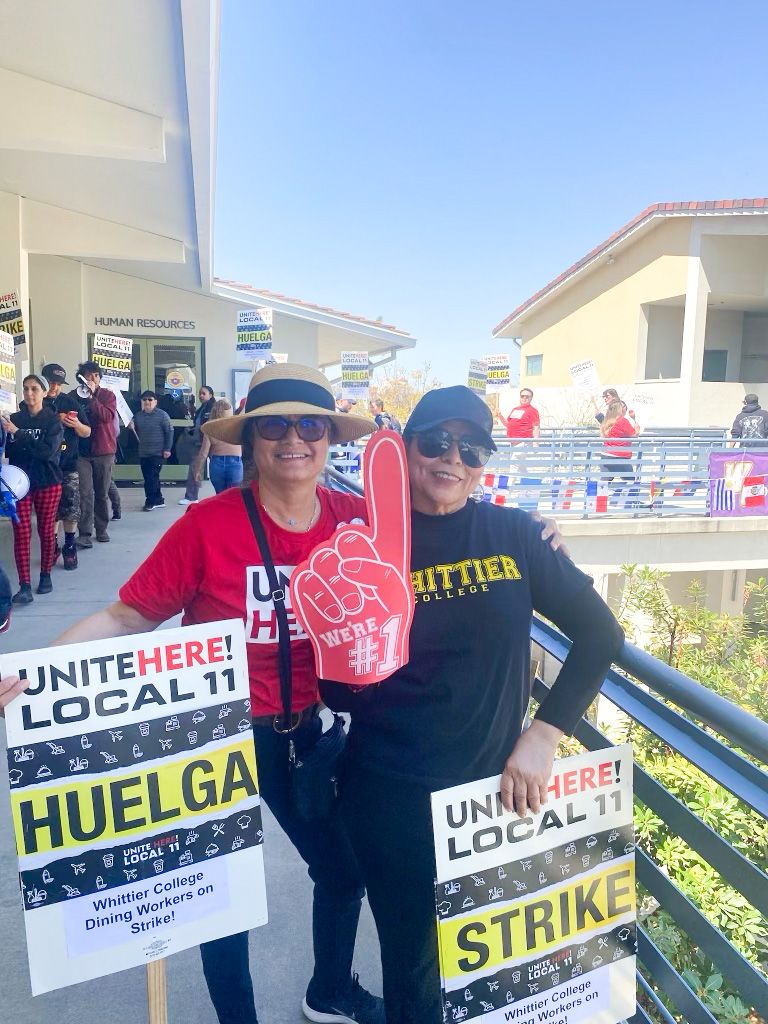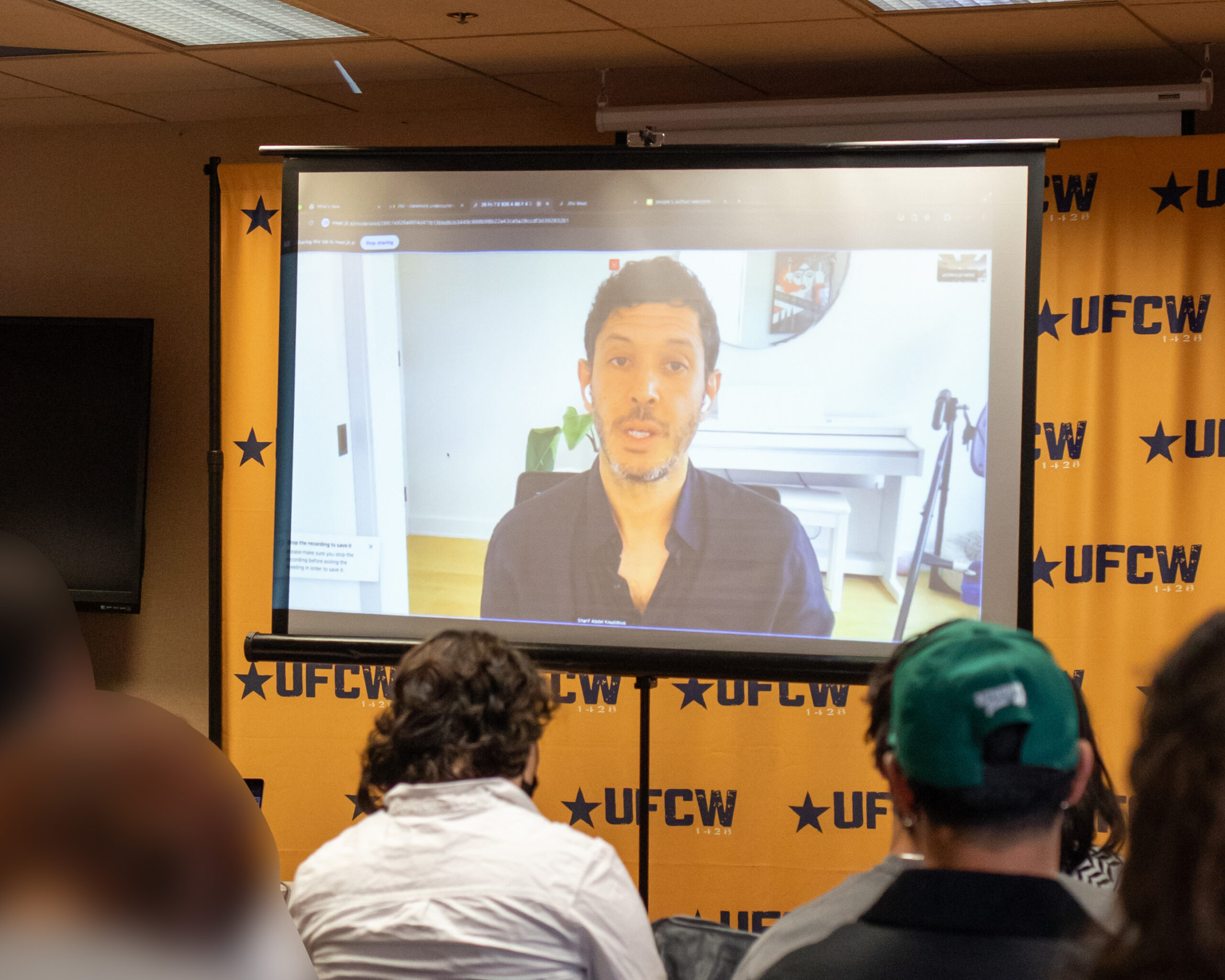
May 15, 2023
Pomona and Pitzer fights set the precedent for the win, organizers said

On April 29, dining hall workers at University of La Verne and Whittier College received the news of their contract win with historic increase in wage and inclusion of pension benefits, after a year of contract negotiations and actions culminating in an indefinite strike at Whittier that started on March 27.
Full details of the new contract have not yet been release because Bon Appetit has not yet signed the agreement, according to UNITE HERE! Local 11 representative Arun Ramakrishna, but but workers said there were significant accomplishments in the new contract.
The new three-year contract starts October 2022 and ends October 2025, after the previous contract expired in October 2021.
“Two of the biggest things that we really need [and successfully won] in this contract was the wage increase and the pension.”, Gilson said.
“We’re all getting major raises. It’s not a small $1 or $1.50.” said Sean Fricke, who has been working at La Verne as a cook for five and a half years.
According to Stephen Gilson Jr. ULV ‘25, the new contract also offers $1 in pension for every hour of work. The previous contract did not include pensions.
Negotiations with Bon Appetit began after the workers’ previous contract expired in October, but soon stagnated. “Tired of going in circles” in negotiations and bolstered by Pomona workers’ contract win in January, workers planned escalatory actions.
On March 8, La Verne union workers picketed in front of a campus dining hall, joined by members of the Claremont Student Worker Alliance, Whittier Student Worker Alliance and Whititer workers. At Whittier, workers organized a one-hour-long work stoppage on March 17, and an indefinite strike that started on March 27.
Macias shared that their management company’s response to workers’ escalated actions was minimal. She recalled that after the company ignored the work stoppage at Whittier.
“It didn’t faze them,” she said.
In response to the company’s unresponsiveness, workers at Whittier voted to go on an indefinite strike until a contract is decided. Over 85 percent of workers voted in support of the strike.
At La Verne, after a contract win at Pomona on Jan. 18, workers voted on Feb. 28 to authorize a strike for the first time in La Verne’s history. 17 out of 19 workers voted in support of the strike, with one vote abstaining.
Despite BAMCO’s non-responsiveness, morale surrounding the strike was high at La Verne and Whittier, Gilson and Macias said.
“Everybody’s morale was amazing, because that gives us, the employees, power that we set out [to have]. We planned something and we did it.” said Macias.
Gilson recalled that 16 out of 18 workers participated in the strike.
“When we got the news that we’re going to strike, it definitely lit a lot of people up and we’re all very excited to go so we actually had a good chunk of our workers out there.” he said.
From March 27 until April 22, workers at Whittier picketed in front of both Whitter’s dining halls from 7 a.m. to 7 p.m. on Mondays through Fridays, as well as through the nearby streets of Whittier.
Marcias recalled that BAMCO finally decided to respond 27 days after the strike started, when the Vice President of BAMCO reached out to UNITE HERE’s chief negotiator through a phone call.
“I think they got the message, like, we were going to keep doing this at both places [ULV and Whittier] until something was met.”
Strikes were also driven by wins at Pomona College and Pitzer College, according to Gilson and Fricke.
“When we heard about that [the contract win at Pomona and certification win at Pitzer], our union rep immediately came and told us… and we all were excited, because it was a boost in morale, because by that time, it’d already been three months or so that we have been trying to negotiate.”
Gilson also shared that despite having yielded success, organizing actions was difficult because of the conservative atmosphere among La Verne student body.
“[Getting the students involved] was very challenging, nowhere near what I wanted to get… La Verne is a more conservative part of LA county. And the cherry on top is that a lot of people that go to La Verne are business majors. Unions and business don’t really mix and match.”
There were students at La Verne who expressed annoyance about the strikes, Gilson said. “A lot of people weren’t really happy with us. A few students complained that they didn’t like the fact that we’re making noises at seven in the morning… Some people said they felt guilt-tripped, like they wanted to support but they also have to eat.”
Aside from lack of support from the student body, Gilson and the student organizers also faced resistance from management while handing out flyers and talking to students. He recalled one incident when management called security on them and CSWA members who were there to help with distributing flyers and talking to students.
“I was having a conversation with this couple when one of my coworkers walked by… she let me know that my general manager had called security on me and the Claremont students. At that point, I was fuming because not only was [we] had done nothing illegal or wrong, [but also] everyone we were talking to spoke to us consensually, [and] we didn’t disrupt service.”
Gilson was thankful that they received help with organizing from CSWA, including handing out flyers and talking to the students about upcoming actions.
“Without CSWA, I would probably have been screwed.”
Despite the contract win, Sean shared that sometimes, management at La Verne is not fully familiar with the terms in the contract itself and thus does not follow the contract properly. He recalled a time when the management called out an employee who was talking to a union member. After he was notified of the incident, he sent to management a screenshot of the contract at the time and highlighted the paragraph that states that workers are legally allowed to talk to union employees. The incident was resolved with an apology from management.
“They completely changed their minds once we threw the contract back at them… [But] if it’s a contract that we signed and the company signed, then the managements hould know what is in the contract and what is not in the contract.”
Despite mishandling from management in implementing the contract, the contract win brings workers enthusiasm and hope. Fricke said that the contract win brings La Verne and Whittier closer.
“The fact that we were able to work together really hard and it showed [that] if we work together, we can make things happen.” he said.
According to Mayra Macias, a cashier/ barista and one of the shop stewards at Whittier College for 17 years, the pension brings her a different future.
“We’ve never had a pension.” she said. “That’s something totally new for us… we don’t know how that [is going to] feel.”
Mayra also shared that she hopes the new contract allow her to quit her second job and spend more time with her family. She also hopes to be able to cover additional emergency expenses.
“When my car broke down, I could only afford the front brakes… life starts to get complicated, because you don’t have the means to pay for things. So things start stacking up. [With the new wage raises], that starts to look different.”


Commentary

Palestine

Palestine

Undercurrents reports on labor, Palestine liberation, prison abolition and other community organizing at and around the Claremont Colleges.

Issue 1 / Spring 2023
Setting the Standard
How Pomona workers won a historic $25 minimum wage; a new union in Claremont; Tony Hoang on organizing
Read issue 1